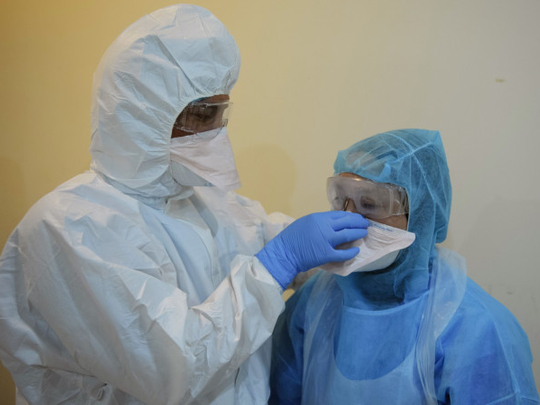
Thomas Eric Duncan, the first person to die of Ebola in the US, was not the right kind of victim for the West: He was not a pretty young woman smiling in sunglasses as a Cavalier King Charles spaniel named Bentley licks her cheek. He did not have a young, benevolent doctor’s face that looks “appropriate” plastered on newspapers. He was not a kindly older nurse who told reporters how God had spared her. He was not the kind of person to whom primetime news specials would dedicate 20 minutes and glorify with quotes from loved ones about his kind spirit or ceaseless determination to overcome an unfair affliction.
Duncan was black, he was poor — and he was African.
A Dallas hospital turned away the uninsured Liberian immigrant after an initial exam concluded he suffered only from a “low-grade viral disease” and the media turned him into the unsympathetic, undeserving face of a contagion with which the West is frantically grappling. He — and the West Africans to whom he is tied by both birth and cause of death — have become nothing more than disease vectors responsible for infecting innocent western health workers, tarnishing pristine nations by importing the blemish of an African scourge. And yet, American citizenship alone does not sanitise the blight of blackness. Amber Joy Vinson, the second health care worker diagnosed with the virus, is already being met with scrutiny as Nina Pham’s quarantined dog receives an outpouring of support.
Ebola now functions in popular discourse as a not-so-subtle, almost completely rhetorical stand-in for any combination of “African-ness”, “blackness”, “foreign-ness” and “infestation” — a nebulous but powerful threat, poised to ruin the perceived purity of western borders and bodies. Dead African bodies are the nameless placeholders for (unwarranted, racist) “panic”, a conversation topic too heavy for the dinner table, yet light enough for supermarket aisles.
To date, fewer than 20 cases of Ebola have been treated outside West Africa in the current outbreak. Meanwhile, in West Africa itself — mostly in Sierra Leone, Guinea, Liberia and Nigeria — the death toll has risen to nearly 4,500. Girls and women in the region, tasked with the gendered social responsibility of caring for sick family members, are dying at a rate that eclipses their male counterparts. Liberia is perilously under-resourced to deal with the outbreak and the US has perhaps ominously committed only military personnel there. “If this epidemic of Ebola rages out of control in West Africa,” Barack Obama said on Wednesday evening, “it will spread in an age of frequent travel and the kind of constant interactions that people have across borders.”
However, we will still write off the “Africa patient” who infected a hospital in Spain and not bother with silly things like geographic specificity. We will breathe a sigh of relief when we remember that the Spanish priest infected in Liberia was afforded access to an experimental drug though West Africans were not. After he died, we wondered aloud whether Africans even deserve Christianity. We will tweet about how much more terrifying Ebola is than black-eyed ghost children. We will make sure to specify that alcohol, not Ebola, killed a British man in Macedonia. We will suggest that Ebola is so common among West Africans — even the ones who make it to New York City — that it may as well be part of the weather forecast. We will not mention that Nigeria has not had a live case in six weeks.
We will try to hide our fear behind jokes with dying black bodies as their punchlines. We will “self-quarantine”. We will dedicate Reddit threads and Twitter accounts to our Ebola “jokes”. We will giggle at our Ebola memes. We will suggest that perhaps Ebola is really just the Daesh (Islamic State of Iraq and the Levant) of biological agents. And when this is all over, we will move on and find a new reason to weaponise black suffering to account for our unshakeable fear. There will always be a new emergency, a new threat, a new reason that black bodies cannot be allowed to infiltrate the borders of nations that our blood and sweat have built. Black death is remarkable only to the extent that its perpetrator could also affect citizens more deserving of sympathy, of news coverage and of life.
We are comfortable with viruses that ravage entire communities, so long as those communities do not look like the ones we believe are deserving of health. Black bodies exist only on the receiving end of apocalyptic fanfare like airport screenings designed to weed out Ebola carriers (with dubious success) or excessive, deadly force from police that claim to protect and serve all people. Africa exists only in stark contrast to the civilised West, where disease and disorder must be contained to preserve health and hierarchy. To be black — African or otherwise — is to be born into a world that anticipates your death with bated breath (or botched execution cocktail, or vigilante bullet, or syphilis needle). It is to occupy a position of social death, to exist in a liminal space that guarantees neither rights nor recognition under the law. It is to be a perpetual contaminant in the body of the western world.
— Guardian News & Media Ltd
Hannah Giorgis is a black feminist writer and organizer based in New York City.









